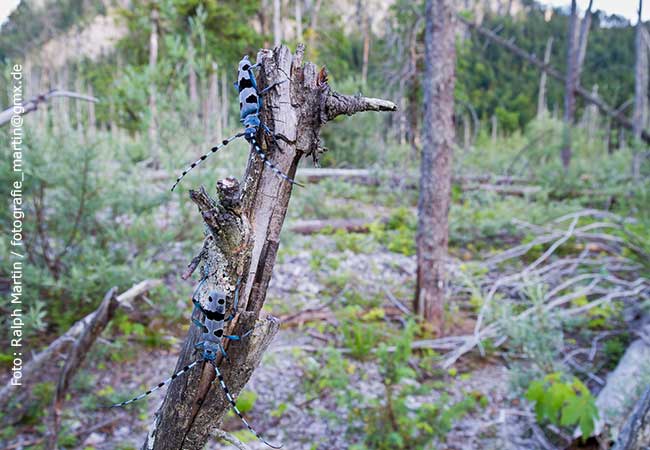
The speed at which deadwood decomposes in forests depends on the climate as well as on fungi and insects. An international research team including Professor Claus Bässler, Institute of Ecology, Diversity and Evolution of Goethe University Frankfurt, has now determined the annual contribution made by deadwood to the global carbon cycle and quantified the importance of insects in the decomposition of wood for the first time. (Nature, DOI: 10.1038/s41586-021-03740-8)
Living trees absorb a considerable amount of carbon dioxide from the atmosphere and therefore play an important role in the protection of our climate. Little is known about the role of dead trees in the global carbon cycle, though. The decomposition of wood and the recycling of the nutrients it contains are among the most important processes to take place in forests.
How much carbon is released from decaying wood worldwide? What role do insects play in this process? These questions have now been studied in a global research project established by the Bavarian Forest National Park and coordinated by the Julius Maximilian University of Würzburg (JMU) and the Technical University of Munich (TUM).
The scientists claim that according to the report, some 10.9 giga-tons of carbon are released from deadwood worldwide every year. In this context, part of the carbon is absorbed into the soil, while another part is released into the atmosphere. The amount of carbon released from deadwood is equivalent to roughly 115 percent of the emissions from fossil fuels.
“At 93 percent, tropical forests contribute disproportionately to this result due to their high wood mass combined with their rapid decomposition processes. Decomposition in temperate and boreal forests is considerably slower indicating that deadwood stores carbon over long time periods in these regions. Insects account for almost one third of wood decomposition, although this is mostly confined to the tropics. In boreal and temperate forests, the contributions made by insects are small, though,” explains PD Dr. Sebastian Seibold, lead author of the study.
“At a time of global change, we can see some dramatic declines in biodiversity and changes in climate. This study has demonstrated that both climate change and the loss of insects have the potential to alter the decomposition of wood, and therefore, the carbon and nutrient cycles worldwide,” explains PD Dr. Seibold.








